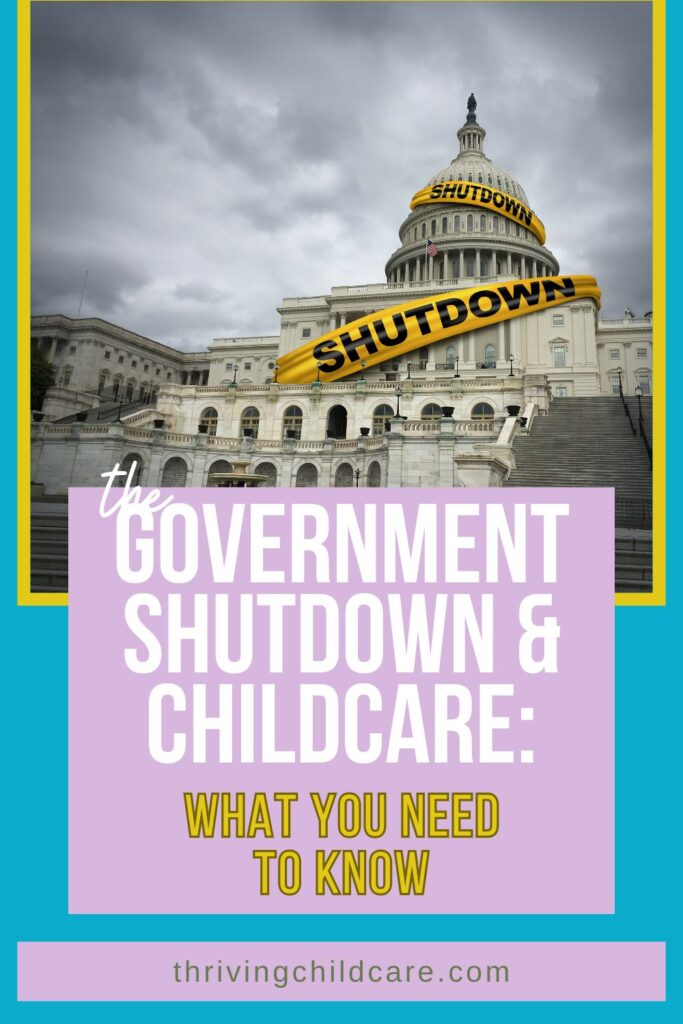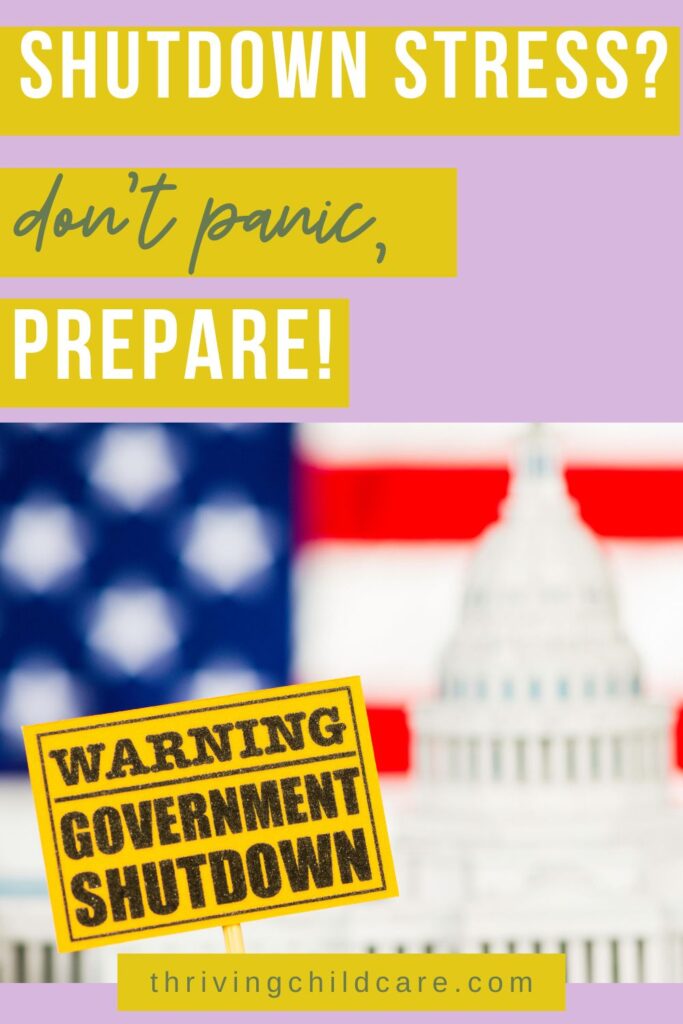How everyone is talking about the government shutdown—including childcare providers (October 1, 2025). I remember back in 2018 when I was still running my program how the government shutdown had me unsure about how it would impact my business. Honestly, you don’t even think about these things until they happen. Then, all of a sudden, you’re sitting there wondering, “Does this mean parents can’t pay me? Do food program checks stop coming? Will my business survive if this drags on?”
I learned a big lesson back then: a government shutdown is not just political news you can scroll past. It can reach right into your daycare or childcare center and shake things up in ways you never thought about.
So, what does this shutdown actually mean for you as a childcare provider? Let’s break it down in plain English.
First Things First: What’s a Government Shutdown?
In simple terms, a government shutdown happens when Congress and the President can’t agree on how to spend money. Without that agreement, a lot of federal agencies stop running, or at least slow down. “Non-essential” workers get furloughed, meaning they’re told not to come to work, and services we usually count on may pause or get delayed.
Now, that doesn’t mean every single government program stops. Some things keep moving. And for childcare, here’s a piece of good news: most programs, including Head Start and child care subsidy programs, are not immediately affected by a shutdown. That means for the short term, business should continue as usual. But the longer the shutdown drags on, the bigger the risk of disruptions down the road.
Government Shutdown Childcare Impact
The Ripple Effect on Childcare
So, how does all this political mess in Washington reach your daycare doors? Here are a few things to keep in mind:
1. Families Might Be Strapped for Cash
If parents in your program work for the federal government, or if they rely on government programs for food or childcare subsidies, they could feel the hit fast. Imagine trying to collect tuition when your families aren’t getting paychecks. It’s not just stressful for them—it can quickly become stressful for you.
2. Subsidy Payments Could Stall (Eventually)
Programs like the Child Care and Development Block Grant (CCDBG) or food program reimbursements (CACFP) rely on government funding. While they are not expected to stop right away, if the shutdown lingers, there’s a chance payments could be delayed. That doesn’t mean the money disappears, but it might not come when you expect it. And let’s be real—late checks don’t pay bills on time.
3. Parents Start Asking Tough Questions
When the news is all about a shutdown, parents get nervous. They’ll ask: “Will this affect my childcare?” “Are you going to close?” Even if your program isn’t immediately impacted, they’ll look to you for answers. Being prepared with clear, calm communication can go a long way in keeping trust strong.
The Longer It Goes, the Heavier the Load
Here’s the truth: a one-week shutdown might feel like a blip. Annoying, yes, but manageable. But when it drags on for weeks—or worse, months—it can turn into a serious problem.
- Food program checks delayed means you’re covering the grocery bill out of pocket.
- Parents missing paychecks means tuition becomes unpredictable.
- Programs that rely heavily on federal grants, like Head Start, might eventually be forced to make tough calls if the funding pipeline slows.
So while there’s no need to panic on Day One, the longer it goes, the more providers like you have to juggle uncertainty.
So, What Can You Do About It?
This is where I always remind myself: I can’t control Congress, but I can control how I run my business.
1. Keep Your Parents in the Loop
Don’t let rumors take over. A simple newsletter, text, or parent meeting can calm nerves. Let them know what you know, and admit what you don’t. Parents respect honesty more than silence.
2. Double-Check Your Budget
Ask yourself: “If subsidy or food payments are late this month, how will I cover my costs?” Having even a small cushion can be the difference between panic and peace of mind.
Let’s make your childcare program even more amazing together! CLICK HERE to see how Adrienne can help you tackle the toughest challenges in your childcare business, boost your growth, and set you on the path to success.
3. Have a Backup Plan for Tuition
If you know a family is struggling because of the shutdown, consider flexible payment options. That doesn’t mean running your business for free, but it does mean showing some compassion. In the long run, families remember providers who worked with them during hard times.
4. Stay Connected with Resources
State agencies, local childcare networks, and provider associations often send out updates during shutdowns. Don’t sit in the dark—make sure you’re on their email lists or social media pages.
Related Reading:
- How Childcare Providers Can Easily Create an Extra Income Stream
- How to Handle Cash-Flow Crunches in Your Childcare Business
[FREE DOWNLOAD] Here Are The 10 Must-Have Daycare Templates
Why This Actually Might Be a Wake-Up Call
Here’s the controversial part: sometimes these shutdowns remind us of how fragile our businesses can be when we rely too heavily on outside systems. I’m not saying you should cut off every government program tomorrow. But it is a reminder to look at how diverse your income streams are. Could your business survive a few weeks without subsidy payments? Do you have savings or other support in place?
I know that’s a hard pill to swallow. But asking these questions now can help you build a stronger, more resilient business for the future.
Don’t Panic, Prepare
I get it. When the news is full of politicians pointing fingers, it’s easy to feel powerless. But here’s the good news: you’re not powerless. You can take steps to steady your business, keep families informed, and remind yourself that shutdowns don’t last forever.
As business owners, we need to learn not to panic when the unforeseen occurs. Every challenge—yes, even a government shutdown—can become a chance to get sharper, stronger, and more prepared.
Your families need you. Your staff needs you. And most of all, the kids need you. With a clear head and a steady plan, your childcare business can not only survive times like these—it can continue to prosper and thrive.
